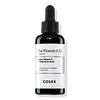What's inside
What's inside
 Key Ingredients
Key Ingredients

 Benefits
Benefits

 Concerns
Concerns

 Ingredients Side-by-side
Ingredients Side-by-side

Water
Skin ConditioningHamamelis Virginiana Water
AstringentAscorbic Acid
AntioxidantGlycerin
HumectantMagnesium Ascorbyl Phosphate
AntioxidantTetrahexyldecyl Ascorbate
AntioxidantAlcohol Denat.
AntimicrobialTocopheryl Acetate
AntioxidantVanilla Planifolia Fruit Extract
Skin ConditioningPassiflora Incarnata Fruit Extract
Skin ConditioningXanthan Gum
EmulsifyingPolysorbate 20
EmulsifyingCaprylyl Glycol
EmollientPolyglyceryl-4 Caprate
EmulsifyingPhenoxyethanol
PreservativeWater, Hamamelis Virginiana Water, Ascorbic Acid, Glycerin, Magnesium Ascorbyl Phosphate, Tetrahexyldecyl Ascorbate, Alcohol Denat., Tocopheryl Acetate, Vanilla Planifolia Fruit Extract, Passiflora Incarnata Fruit Extract, Xanthan Gum, Polysorbate 20, Caprylyl Glycol, Polyglyceryl-4 Caprate, Phenoxyethanol
Water
Skin ConditioningAscorbic Acid 23%
AntioxidantPropanediol
SolventDimethicone
EmollientTromethamine
BufferingPanthenol
Skin Conditioning3-O-Ethyl Ascorbic Acid
Skin ConditioningSqualane
EmollientCaffeine
Skin ConditioningSodium Chloride
MaskingSodium Hyaluronate
HumectantSodium Sulfite
PreservativeDisodium EDTA
Glutathione
Adenosine
Skin ConditioningAcetyl Glucosamine
Skin ConditioningGardenia Florida Fruit Extract
Skin ConditioningAllantoin
Skin ConditioningDextrin
AbsorbentTocotrienols
Skin ConditioningTocopherol
AntioxidantElaeis Guineensis Oil
EmollientButylene Glycol
HumectantArginine
MaskingNiacinamide
SmoothingPentylene Glycol
Skin ConditioningAlcohol Denat.
AntimicrobialHelianthus Annuus Seed Oil
EmollientGlycyrrhiza Glabra Root Extract
BleachingMethyl Trimethicone
Skin ConditioningCarthamus Tinctorius Seed Oil
MaskingCamellia Japonica Seed Oil
EmollientDaucus Carota Sativa Root Extract
Skin ConditioningBeta-Carotene
Skin ConditioningWater, Ascorbic Acid 23%, Propanediol, Dimethicone, Tromethamine, Panthenol, 3-O-Ethyl Ascorbic Acid, Squalane, Caffeine, Sodium Chloride, Sodium Hyaluronate, Sodium Sulfite, Disodium EDTA, Glutathione, Adenosine, Acetyl Glucosamine, Gardenia Florida Fruit Extract, Allantoin, Dextrin, Tocotrienols, Tocopherol, Elaeis Guineensis Oil, Butylene Glycol, Arginine, Niacinamide, Pentylene Glycol, Alcohol Denat., Helianthus Annuus Seed Oil, Glycyrrhiza Glabra Root Extract, Methyl Trimethicone, Carthamus Tinctorius Seed Oil, Camellia Japonica Seed Oil, Daucus Carota Sativa Root Extract, Beta-Carotene
 Reviews
Reviews

Ingredients Explained
These ingredients are found in both products.
Ingredients higher up in an ingredient list are typically present in a larger amount.
Alcohol Denat. is an alcohol with a denaturant property. It is created by mixing ethanol with other additives.
This ingredient gets a bad rep because it is irritating and drying - mostly due to its astringent property. Astringents draw out natural oils in tissue, constricting pores and leaving your skin dried out.
However, alcohol denat. is not all that bad.
Due to its low molecular weight, alcohol denat. tends to evaporate quickly. One study on pig skin found half of applied alcohol evaporated in 10 seconds and less than 3% stayed on skin.
This also helps other ingredients become better absorbed upon application.
Studies are conflicted about whether this ingredient causes skin dehydration. One study from 2005 found adding emollients to propanol-based sanitizer decreased skin dryness and irritation. Another study found irritation only occurs if your skin is already damaged.
Small amounts of alcohol are generally tolerated by oily skin or people who live in humid environments.
The rule of thumb is if this alcohol is near the end of an ingredients list, it will probably not affect your skin much.
Also...
This ingredient has antimicrobial and solvent properties.
The antimicrobial property helps preserve products and increase their shelf life. As a solvent, it helps dissolve other ingredients.
Other types of astringent alcohols include:
Learn more about Alcohol Denat.Ascorbic Acid is is pure Vitamin C. This form makes up the largest amount of vitamin C found naturally in our skin.
Not only is vitamin C great for your overall health and immune system, it also has plenty of benefits on your skin.
Vitamin C is best used for brightening skin. It improves dark spots, acne scars, and hyperpigmentation. This is because it blocks the process of skin darkening when exposed to UV.
Remember: Vitamin C should not replace sunscreen!
Your skin uses vitamin C to build collagen. Collagen is one key component in having a strong skin barrier and plump skin. Vitamin C also plays a role in regulating collagen, thus making it effective in improving wrinkles and fine lines.
Ascorbic acid shows potent antioxidant activity. As an antioxidant, it helps fight free-radicals. Free-radicals are molecules that may damage your skin cells. These antioxidants also protect skin against UV damage.
The best formulations include Vitamin E and/or ferulic acid. These two ingredients help stabilize and provide a boost in the benefits of ascorbic acid. This is because ascorbic acid becomes unstable when exposed to UV and air. In fact, you can tell your ascorbic acid has oxidized when it turns an orange-yellow color.
Ascorbic acid is generally compatible with other ingredients. However, using ascorbic acid with other active ingredients might cause irritation. Two ingredients: copper ions and benzoyl peroxide, will inactivate ascorbic acid completely.
Read more about other types of Vitamin C:
Foods rich with vitamin C include oranges, strawberries, broccoli, bell peppers, and more. When consuming Vitamin C, your skin receives a portion of the nutrients.
Learn more about Ascorbic AcidWater. It's the most common cosmetic ingredient of all. You'll usually see it at the top of ingredient lists, meaning that it makes up the largest part of the product.
So why is it so popular? Water most often acts as a solvent - this means that it helps dissolve other ingredients into the formulation.
You'll also recognize water as that liquid we all need to stay alive. If you see this, drink a glass of water. Stay hydrated!
Learn more about Water